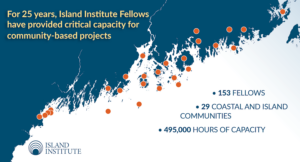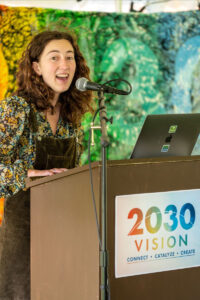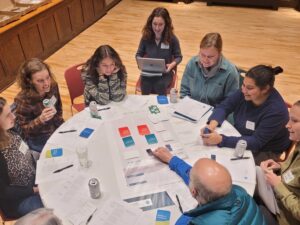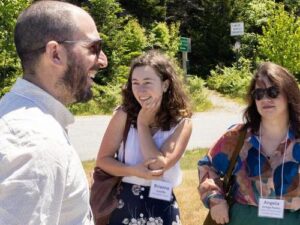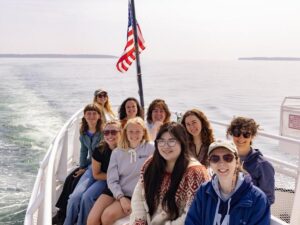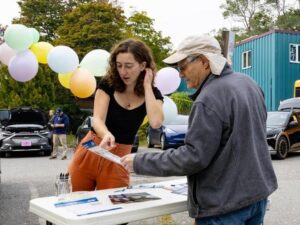AN EXTRA SET OF HANDS—A LEGACY IN COMMUNITY
Like Grace Carrier’s work with the Brooklin Climate Response Committee demonstrates, Island Institute Fellows bring critical capacity directly to Maine’s island and coastal communities. With your support, Fellows can continue to serve as an enthusiastic extra set of hands for community-driven projects along the Maine coast. Will you join us in supporting this critical resource?
BECOME A MEMBER OR RENEW TODAY
We’re proudly marking a quarter century of the Island Institute Fellows program.
Since the first fellow arrived on Chebeague in 1999, the Island Institute Fellows program has brought dedicated capacity directly to Maine’s island and coastal communities by pairing recent college graduates with local town governments and nonprofits.
Twenty-five years later, Fellows continue to serve as an enthusiastic extra set of hands for community-driven projects along the Maine coast. Taking on everything from sea level rise and working waterfront rebuilding to afterschool programs, Island Institute Fellows have provided a total of more than 495,000 hours of capacity to municipalities, school systems, and community organizations. The two-year fellows often form lifelong ties to the communities they serve along the way.
In small coastal communities, but perhaps especially on islands, individual volunteers often wear many hats and step up again and again to fill essential community leadership and planning roles. Faced with the limitations of a finite pool of people, the added capacity a fellow provides can make a huge difference to rural and remote communities.
To learn more about the impact of the Island Institute Fellows program over the last 25 years, please see here.
“I can testify to the power of having a Fellow in the community and living within the community. There are a scarce number of resources to do all that needs to be done, and the Fellows Program is a great way to address this issue.”
— Linda Nelson, Fellows Advisor, Deer Isle-Stonington
Meet Brie Cunliffe!
For the past two years of her fellowship, Brie led the town of Tremont in developing a Community Resilience Plan that prioritizes energy affordability and reliability, supports the working waterfront, and builds a connected, thriving year-round economy. She also coordinated community-wide Climate Ambassadors programming, which guides other individuals to find their unique contribution to climate action.
After completing her fellowship this August, Brie’s hands-on experience in facilitating community-based climate action in coastal communities will be put to good use as she heads to the Westfjords of Iceland to pursue a Masters in Coastal Communities and Regional Development. She hopes to return to the Maine coast to write her thesis, and to continue to partner with the communities that she loves to build a thriving climate future.
On Mount Desert Island, this is only the beginning: with the new Community Resilience Plan adopted with a vote of 89-1, the town of Tremont is now ready to pursue actionable, solutions-focused strategies to tackle community climate impacts head-on.
“Brie’s impact on me and the town of Tremont is beyond measure!! She collaborated with the strategic partners and, most importantly, with the people of Tremont to write our town’s community resilience plan; accepted through town vote and now in effect!”
— Sarah White, Chair of the Tremont Sustainability Committee
“When 75 percent of Maine’s coastal communities have fewer than 3,500 residents, and 25 percent have fewer than 800 residents, the addition of one full-time fellow’s work and dedication can make the difference in a community’s ability to write a grant, facilitate community planning, preserve historical documents, launch a new initiative, or train volunteers and future leaders.”
— Congresswoman (and North Haven resident) Chellie Pingree
Meet Thomas McClellan!
Learn how Island Institute Fellow Thomas McClellan is helping the Monhegan community build resilience to sea level rise and coastal storms.
Monhegan, a remote island in the Gulf of Maine, faces significant challenges as sea levels rise and storms become more frequent. Unfortunately, small communities often lack the people and funding needed to tackle these big, costly, long-term projects.
To help meet this challenge, Thomas McClellan, an Island Institute Fellow with roots in Maine and a degree in Sustainability and Oceanography from Dalhousie University, began a two-year fellowship with the Monhegan Plantation to help the community replace their public wharf and shore up other waterfront access areas.
In his first few months, Thomas has completed permitting for their freight shed breakwater and shoreline project, started applications for a community action grant, and created an island-wide survey on waterfront usage. His expertise and dedication to strengthening Monhegan’s working waterfront are crucial to helping the community prepare for future storms and thrive in the years ahead.
Your gift adds critical capacity for Maine’s island and coastal communities.
Today, Maine’s islands and coastal communities are facing increased pressures compounded by climate change: sea level rise threatens to jeopardize our coastal infrastructure, housing costs are skyrocketing, and warming ocean temperatures are posed to disrupt the fishing industry so many coastal families rely on.
These are huge challenges to tackle, and they will test the strength and preparedness of our communities. By working with and within a small community, our Island Institute Fellows add critical capacity when communities need it most. To be able to respond to community needs and ensure that this indispensable program is able to continue, we are asking for your support.
Your gift this year will help place Island Institute fellows where they are needed most and focus on community-defined, community-led projects that will build resilience to climate change and a stronger marine economy.
Join us in supporting the Island Institute Fellows program, and help create a stronger Maine coast.

